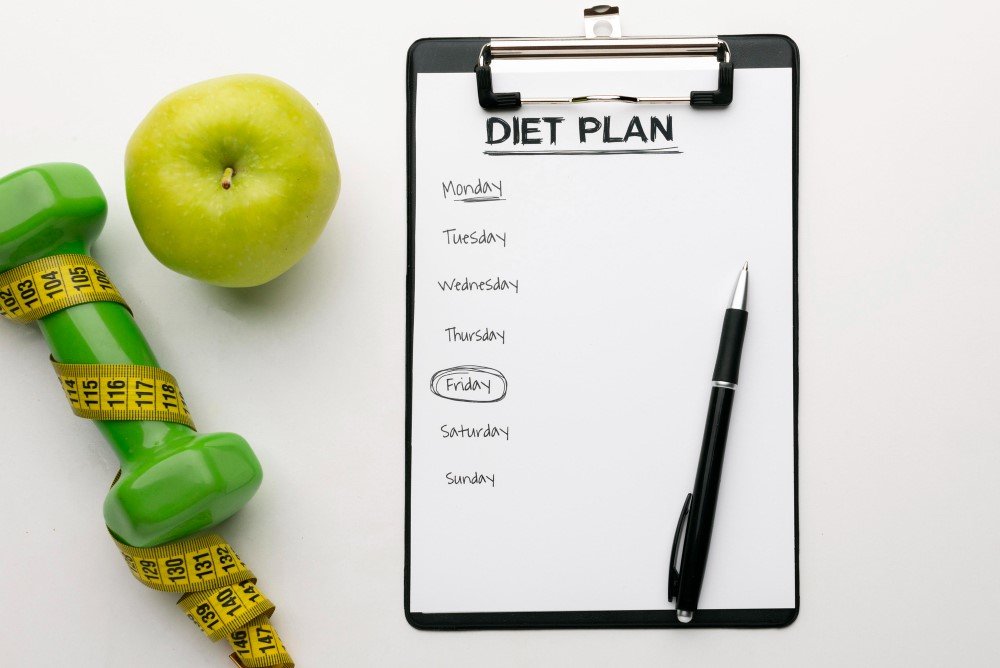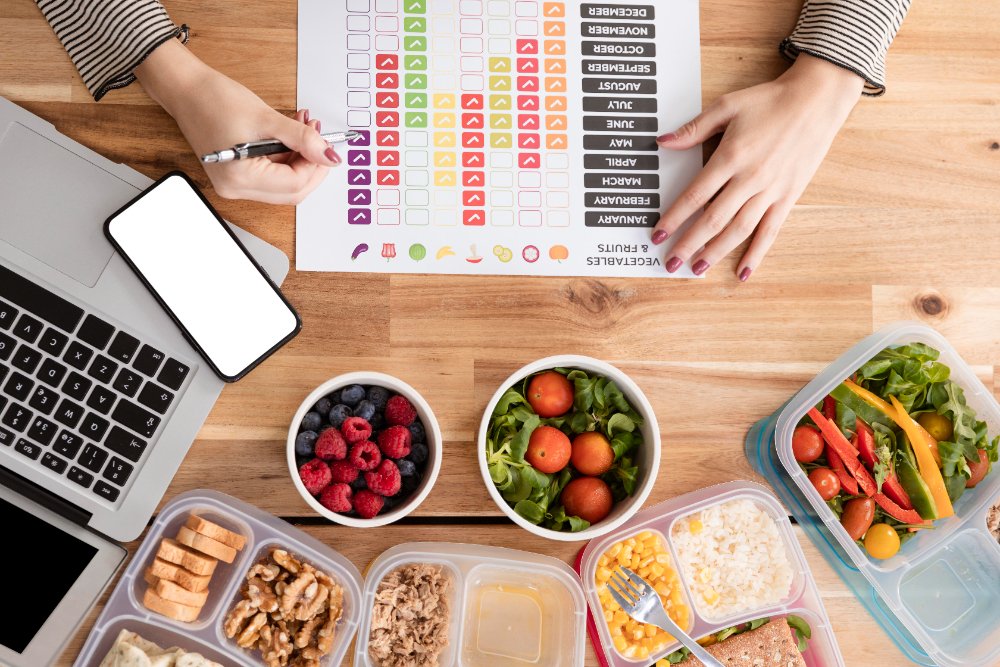How to Gain Weight in a Week:
Gaining weight can be as challenging as losing it, especially for those with fast metabolisms or specific health conditions. If you’re wondering how to gain weight in a week, the answer lies in adopting a strategic approach that includes high-calorie meals, targeted exercise, and healthy lifestyle choices. While it may seem like a short time frame, it’s possible to see noticeable results by focusing on nutrient-dense foods and building muscle. This guide offers practical, science-backed tips to help you achieve your weight gain goals quickly and effectively.
Step 1: Setting Your Weight Gain Goals
Calculating Your Caloric Needs
Start by estimating your Basal Metabolic Rate (BMR) using a formula such as the Harris-Benedict equation. Then, multiply your BMR by an activity factor (sedentary, lightly active, etc.) to determine your TDEE. Add 500–1,000 calories to this number to establish your daily caloric goal for gaining weight.
Setting Realistic Expectations
While it’s possible to gain a noticeable amount of weight in one week, most of this will be water weight, glycogen stores, and some fat or muscle. A safe target is 1–2 pounds of weight gain, though individuals with high metabolisms may need to aim higher.

Step 2: Building a High-Calorie Meal Plan
Choosing Nutrient-Dense Foods
For sustainable weight gain, focus on whole, nutrient-dense foods that are rich in calories. Incorporating calorie-dense options into your meals ensures you meet your caloric goals without feeling overly full.
High-Calorie Food Categories
- Carbohydrates: Oats, rice, whole-grain bread, sweet potatoes.
- Proteins: Chicken breast, eggs, tofu, lean beef, fish.
- Fats: Avocados, nuts, seeds, olive oil.
- Snacks: Cheese, nut butters, dried fruits, granola.
Sample 7-Day Meal Plan
Day 1
- Breakfast: Oatmeal with whole milk, banana, peanut butter, and honey.
- Snack: Mixed nuts and a protein shake.
- Lunch: Grilled chicken, quinoa, and roasted vegetables with olive oil.
- Snack: Greek yogurt with granola and berries.
- Dinner: Salmon, mashed potatoes, and steamed broccoli.
- Evening Snack: Cottage cheese with sliced pineapple.
Day 2
- Breakfast: Whole-grain toast with avocado and scrambled eggs.
- Snack: Trail mix and a glass of whole milk.
- Lunch: Beef stir-fry with white rice and mixed vegetables.
- Snack: A smoothie made with almond milk, spinach, protein powder, and frozen fruits.
- Dinner: Grilled turkey burger with sweet potato fries.
- Evening Snack: A handful of dates and a hard-boiled egg.
(Repeat a similar structure for Days 3–7.)

Step 3: Effective Strength Training
Why Exercise Matters
To ensure your weight gain is primarily muscle rather than fat, integrate strength training into your routine. Compound movements, which work multiple muscle groups, are particularly effective for building muscle mass.
Creating a Weekly Workout Schedule
- Day 1: Full-body workout focusing on compound movements.
- Day 2: Rest or light cardio.
- Day 3: Upper body strength training.
- Day 4: Lower body and core focus.
- Day 5: Rest or active recovery.
- Day 6: Full-body workout.
- Day 7: Rest.
Step 4: Incorporating Healthy Lifestyle Habits
Staying Hydrated & Manage Stress
While it may seem counterintuitive when aiming to gain weight, staying hydrated supports digestion and muscle function. Aim for at least 8–10 glasses of water daily.
Stress can disrupt your appetite and hinder your progress. Engage in activities like yoga, meditation, or even light walks to stay calm and focused.
Getting Quality Sleep
Your body repairs and builds muscle during rest, making 7–9 hours of sleep essential. Poor sleep can hinder recovery and appetite.

Step 5: Overcoming Common Weight Gain Challenges
1. Dealing with a Small Appetite
If you struggle to eat enough, consider:
- Eating smaller, more frequent meals.
- Incorporating calorie-dense liquids like smoothies or milkshakes.
- Adding sauces, spices, and condiments to enhance flavors.
2. Avoiding Digestive Issues & Stay Consistent
Sudden increases in food intake can cause discomfort. Gradually increase portion sizes and opt for easily digestible foods. Building new eating habits takes time. Meal prepping and planning ahead can help maintain consistency, even with a busy schedule.
Rapidly increasing calorie intake can sometimes cause discomfort. Avoid this by:
- Adding fiber-rich foods gradually to your diet.
- Drinking plenty of water to aid digestion.
- Taking probiotics or digestive enzymes if needed.

The Science of Weight Gain
Understanding the Concept of Caloric Surplus
At its core, gaining weight relies on consuming more calories than your body burns, creating what is known as a caloric surplus. This excess energy is stored in the body as fat or used to build muscle, depending on your activity levels and diet composition. To gain weight effectively, it’s crucial to calculate your Total Daily Energy Expenditure (TDEE) and add approximately 500–1,000 extra calories daily for steady progress.
Macronutrient Breakdown for Weight Gain
Calories are important, but their sources matter. Your diet should include a balance of the following macronutrients:
- Proteins: Necessary for muscle repair and growth.
- Carbohydrates: Provide energy and replenish glycogen stores in muscles.
- Fats: Offer a dense source of calories and support hormone production.
Balancing these macronutrients ensures that weight gain comes from lean muscle and healthy fat, not just empty calories.
Advanced Strategies for Faster Results
1. Use High-Calorie Additions
Simple changes can boost your calorie intake:
- Drizzle olive oil over vegetables and salads.
- Add extra cheese to meals.
- Snack on high-fat options like nuts and seeds.
2. Incorporate Supplements
Supplements can provide a convenient calorie boost:
- Protein Powders: Ideal for quick, high-protein shakes.
- Creatine: Supports muscle growth and strength training.

Sample 7-Day Weight Gain Plan
Here’s a sample plan to help you structure your week:
Day 1
- Breakfast: Omelette with spinach and cheese.
- Snack: Handful of trail mix.
- Lunch: Grilled chicken with quinoa and avocado.
- Dinner: Salmon with roasted sweet potatoes.
Day 2
- Breakfast: Pancakes with syrup and a glass of whole milk.
- Snack: Greek yogurt with honey.
- Lunch: Turkey sandwich with cheese and mayo.
- Dinner: Steak with mashed potatoes and green beans.
(Continue for Days 3–7 with variations of high-calorie, nutrient-dense meals.)
Conclusion
In summary, learning how to gain weight in a week involves a combination of consuming more calories, focusing on high-quality nutrients, and engaging in strength-building exercises. By maintaining a caloric surplus, choosing the right foods, and adopting healthy habits, you can achieve noticeable changes in just seven days. Remember to track your progress and adjust your plan as needed to meet your goals. With consistency and dedication, gaining weight can be a straightforward and rewarding journey toward a healthier and stronger you. Start implementing these strategies today and witness the transformation!
Discover amazing information and unique finds on FuseBay! Don’t miss out—visit our website for exclusive articles and top-notch blogs tailored just for you!







